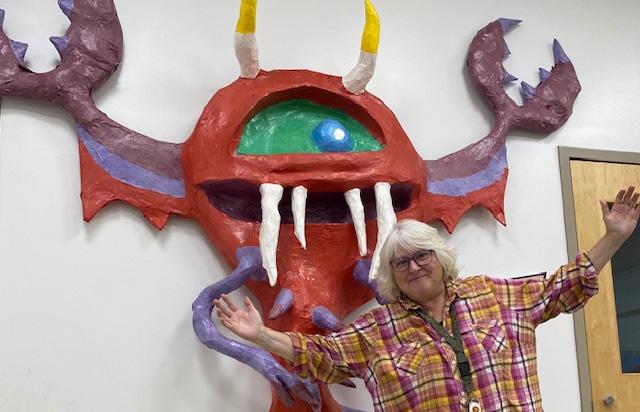
32 minute read
Farewell to Ms. Waring
Ms. Waring departs to pursue life-long goal
Tyler Zimmer ’21
Advertisement
Lining the Lower School halls are sculptures you could find nowhere else. Every year, Ms. Jenny Waring’s first project for her students is a collaborative monster. Made out of PVC pipes, cardboard, and papier-mâché, students from each grade create the annual sculpture. This year’s monster is called “JW Fang,” named by her protégés to commemorate Ms. Waring’s final year at Haverford.
“In 1999, some of the kids were finishing up early, and I had a bunch of junk in the corner that I hadn’t decided what to do with,” Ms. Waring said. “My third graders wanted to do something with it.”
Twenty-two monsters later, Waring’s project has become a hallmark of lower school art. Students love this project, but they really love Ms. Waring.
“All of the art teachers here are actually artists on their own, so the school trusts us to teach in the way that we like to teach and whatever fires our inspiration,” Ms. Waring said.
One of Waring’s teaching strategies is incentive-based. Each time students have a productive and transformative class period, she rewards them with a jump up the “free drawing day” ladder.
Former lower school students remember the excitement of reaching the tenth rung of the ladder, when Ms. Waring would announce their prize.
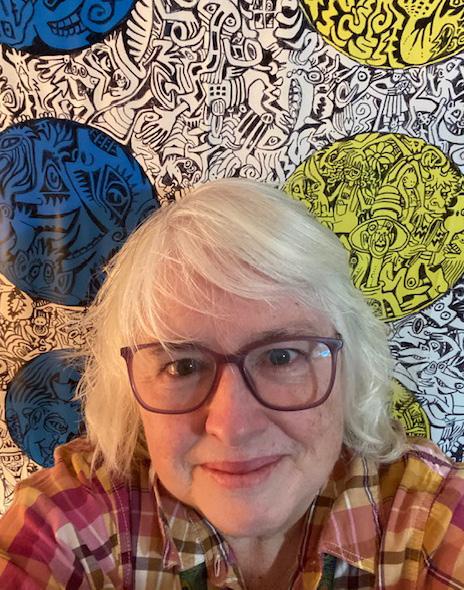
COURTESEY OF MS. WARING
Ms. Waring in front of one of her drawings
MS. JENNY WARING
Complementing her own creativity, Ms. Waring learned new teaching methods from two fellow artists: lower-school colleague Mr. Antonio Fink and her husband Mr. Jeff Waring.
“Mr. Fink and I, we spend a lot of time together between classes. We’ll just visit and bounce ideas off of each other,” Ms. Waring said.
“My husband has been teaching lower school art at Westtown as long as I’ve been teaching here. We’re very different artists, so I see what he teaches and thinks. That’s so amazing.”
Ms. Waring’s students appreciate her energy, creativity, and willingness to expand her curriculum; the warm feelings are mutual.
“This is an amazing place to teach,” she said.
While Ms. Waring helped her students mature both personally and artistically, she noticed similar development in herself.
“I’ve kind of grown up a little bit. In my relationships with people and my unMs. Waring, with one of her papier-maché sculptures
COURTESEY OF MS. WARING
derstanding of myself, sometimes you don’t really understand yourself until you’ve got to be there for someone,” Ms. Waring said.
She also made an impact amongst her colleagues, who reciprocated the love she filled the hallways with every day.
“I had a crisis myself a few years back where I had breast cancer. Both the kids and the teachers really rallied around me. Some people that I had not gotten to know yet were some of the biggest supporters that I had.”
Her 1996 through 2021 tenure at Haverford has come to an end, but the encouraging, creative energy she brought will remain a staple for the art room.
Now, she will pursue a goal that sparked her love for art, bringing her professional career full circle.
In 1985, Ms. Waring graduated from the Rhode Island School of Design with a bachelor of fine arts in illustration. She worked as a freelance illustrator, a skill she’s still working to perfection.
“I’m a little wary of having a specific goal, but writing and illustrating a children’s book has definitely been in the back of my mind for a long time,” Ms. Waring said. “I’ve done clay and multimedia, but my big love is drawing. I really connect to my creativity the strongest is when I’m drawing with a simple pencil.”
She has created several rough sketches on the side during her time as a teacher, but the time has come for her to pursue this lifelong goal full time.
“I would tell my younger self to just be open and really try to break out of those traditional ways that you’ve always gotten a pat on the back about,” Ms. Waring said. “Don’t be afraid to try new things.”
Ms. Waring is tackling this new chapter with determination, but only after a relaxing outdoor summer in the Adirondacks with family and friends.
“Keep your focus,” Ms. Waring said. “Think towards the future, and remember to enjoy yourself along the way.”
Mr. Akkari returns to learning, now for a Ph.D.
Jeffrey Yang ’22
TTucked in a mini-wing, just beyond the stairwells on the first floor, is math teacher Mr. Anwar Akkari’s learning sphere. After joining the Haverford community in Fall 2020, Mr. Akkari has decided to pursue a doctorate in philosophy next year at the University of Virginia.
Despite his short time at the school, Mr. Akkari has learned much about teaching, as he joined after recently obtaining a bachelor’s degree at Yale University. But he also added how the pandemic made it difficult for him to engage with the community as much as he wanted.
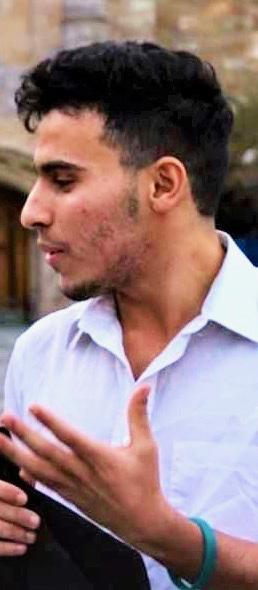
MR. ANWAR AKKARI
“When I was hired, I wasn’t able to meet people and visit the campus because of COVID. It was weird, and at first, it was hard. But I adapted and got much support from the math department, which is such a close group of people. It was also super complicated with getting involved around this year. I wanted to coach,” Mr. Akkari said.
Regardless, Mr. Akkari is grateful to have had the opportunity to work at Haverford and teach his students.
“I enjoy teaching and have loved every bit of it. This community is special. I saw the smiles through the masks and warm faces every day,” he said.
His experience has taught him, among other things, how to handle some of the difficulties of teaching and how the pandemic has complicated pedagogy.
Mr. Akkari said, “I’ve learned about dealing with the amount of stress that you have as a teacher. It’s just been hard to teach in person and teach virtually, and I’ve been trying to keep the [classroom] community together.”
In his math classes, he has made the effort to create an exciting spirit every day.
“Sometimes you have to provide the energy to get it back,” Mr. Akkari said.
As things returned to some sense of normalcy nearing the end of the year, and as classes rounded to an end twice in the third and fourth quarter, he was able to engage with his students as a friend.
“I will remember the ‘two last days of school,’ when I brought the boys outside to play dodgeball and kickball. I really felt that my students were identifying with me as the youngest teacher at school. It was all more friendly and more relaxed, and it just warms your heart,” Mr. Akkari said.
At the beginning of the year, Mr. Akkari certainly did not expect to stay for just one year. In fact, after the first day, he saw himself staying at Haverford for a long time. But, with the difficulties of hiring in the pandemic, the school was searching for a teacher who could teach both biology and math.
“I could teach other sciences—physics, chemistry, or whatever—but not biology. I wanted to be competent with teaching my classes, so I declined,” he said.
At the University of Virginia, Mr. Akkari will also conduct research in aerospace engineering and continue to help students in the classroom as a teaching assistant. In a message to the students, he encouraged them to look at this past year with a bright mindset.
MR. ANWAR AKKARI
“Take this year and don’t think bad about it,” Mr. Akkari said. “Think about all the things you’ve learned. It feels like it’s been a tough year for students, but I know they will grow to be one of the most resilient generations.”
Fifth grade English icon Mr. Lignore returns to his teaching roots

CHRISTOPHER SCHWARTING ’24
Mr. Joseph Lignore at his desk in his lower school classroom
Christopher Schwarting ’24
Iam a Fifth Grade student at Te Haverford School. I am respectful and committed to everyone I meet and everything I do. For those who have navigated the Lower School, this pledge may hold a sentimental weight.
Situated in the right-end classroom of the fifth-grade pod, one will find a classroom bustling in support of the student who has worked on a newly-sung rap to memorize his prepositions. Next, you might find students collaborating on an ingenious public rendition of the theme from Gilligan’s Island. Or, maybe, the room will be filled by the wideeyes of awe, following a masterful storyteller bringing to life the physical struggles and verbal strain of surviving Fever 1793 .
Mr. Lignore’s mission to inspire a passion for English and a greater respect for community has remained unwavering. For many students, the joy one feels when entering this English class is like no other, and this sentiment is similarly shared by its teacher, Mr. Lignore, who will bid farewell to the Haverford community.
Mr. Lignore will return to the school where he first taught before coming to Haverford.
MR. JOSEPH LIGNORE
thirteen years. It changed my life even further,” Mr. Lignore said. “Now I would like to go back to Saint Andrew—so it’ll be like bookends.”
For an individual so passionate about literature and writing, Mr. Lignore’s path to teaching students in the classroom was not direct.
“I went to school to be a teacher,” Mr. Lignore said. “After college, I first started out in pre-med. I was putting myself through school and couldn’t work as much as I needed to work and study as much as I needed to study, so my advisor said I had to make a decision, I’m either one or the other, so I changed majors. I loved it for the rest of my four years.”
After graduating as a teacher, there was a problem. It was 1976, and America was facing one of the largest birth-rate drops in its recent history. Fewer babies, in turn, meant fewer students attending elementary and secondary schools. With available teaching jobs dwindling, Mr. Lignore found himself charting a different career path: management.
Mr. Lignore said, “I got a job at Kmart, where I had worked all through high school and college, part time. They gave me credit for all my part-time years and it took me two to two-and-a-half years, [at which point] I finally had my own store. I just went around the East Coast; Harrisburg, Pittsburgh, Baltimore, and back to Philly.”
While cementing himself in a stable managing position, Mr. Lignore still thought of teaching.
“Two things that I always had a problem with [at Kmart] was people didn’t know how to speak, and then they didn’t know how to write. And it would make me crazy—especially the writing part. I told my wife that if I ever get in the position to teach kids how to write, that’s what I would do. I would teach them how to write and then how to speak,” Mr. Lignore said.
And that is exactly what Mr. Lignore chose to do. When the opportunity presented itself, he knew it was a move worth making: teaching young students the values and intricacies of the English language.
“I had an opportunity to teach, so I took it,” Mr. Lignore said. “It made me so happy. I discovered things about myself that I had forgotten about. What I loved to do was write. It was just a great thing and off I went.”
From that point onward, Mr. Lignore committed himself to his students. His thirteen years at Haverford alone have left him with fond memories.
“The kids are often lost in September, and watching them get it—just watching them explode on the scene. They just blossom, and their success is rewarding,” Mr. Lignore said. “It is just so hard to push through the soil and then they finally get it. They get a taste of sunlight and they just open right up. They bloom and they are off to the races writing.”
Above all, Mr. Lignore asserts that the relationships he has nurtured are the highlight of his time at Haverford.
“The relationships are what I will always remember,” Mr. Lignore said. “The boys that I correspond with, boys in middle school and upper school, the boys I keep in touch with. I like looking in The Index, seeing an article by someone I had before, and dropping them a note that I enjoyed the article.”
And for students, it can be those checkins that make the difference.
As Mr. Lignore looked to the future, he reflected on his time at Haverford.
“I’ll certainly miss this place, that’s for sure. I’ll miss the kids the most, and the faculty. The teachers are inspiring, [and] the kids are inspiring,” Mr. Lignore said. “This is the crux of why I’m teaching: Be self aware, be humble and do for others.”
And for many who have passed through fifth-grade English, Mr. Lignore has remained an inspiration for them, too. Each day, a bright smile would await a classroom that would teach so much, yet appear so playful and fun. From the carpet readings to the occasional lemon drop, or even a traditional farewell of “Peace, love, and Bobby Sherman,” Mr. Lignore has left an imprint on the community he has contributed to and the students who have sat in his room.
RUSSEL YOH ’24
“Mr. Lignore was the first teacher who really taught me how to write a strong essay,” Third Former Russell Yoh said. “That has helped me throughout the rest of my Haverford career thus far.”
And while Mr. Lignore is leaving for the Saint Andrew School, there is still much he wants to accomplish. He plans to write a book about his hometown of Yeadon, keep up on his fishing, continue model and diorama building, and take some time to spend with his family.
Mr. Lignore said, “I am totally grateful for everything. I have become such a better person, a better man, a better teacher, better friend all from here. It has been a wonderful ride. But I am not like Roy Rogers yet. I am not going off into the sunset. I’m still riding my horse on the range. Just a different range.”
Mrs. Higgins bids farewell to her former lower school students
Connor Pinsk ’23
Long-time students will no doubt remember Mrs. Jen Higgins–a first grade teacher who has devoted twenty-three years of her career to the school.
For many students, Mrs. Higgins was the one who taught them how to read, one of the pillars in education.
“It has been so gratifying watching my students come in stumbling to get through a three-letter word, and by the end of the year, they are reading on their own and picking up books.” Mrs. Higgins said. “I love the excitement at the beginning of the year when we have our back-to-school meetings. I love the support that my colleagues give each other and the interesting people that I have worked with at Haverford.”
After spending ten years teaching kindergarten, Mrs. Higgins switched to first grade in 2008.
“Ron Duska was the lower school head at that point, and a first grade teacher was leaving, so I decided to try first grade,” Mrs. Higgins said. “I was all about teaching reading, and I loved how much fun it was. It was just great.”
Haverford has taken up such a large part of Mrs. Higgins’s life, and she has learned alot from her tenure.
“[Haverford] has taught me stamina and discipline. It taught me how to get along with people and accept people and their differences.”
Mrs. Higgins’ has taught what she learned from her experience to her three children, who are all now adults.
“I passed these lessons down to my kids. These things that I have learned have helped me be a better person,” Mrs. Higgins said.
Through her long teaching career, Mrs. Higgins has seen many former students graduate.
“It really is amazing. Every year I think about how the gauntlet is the most emotional experience to watch them go across the hall and hug people, and they remember my name,” Mrs. Higgins said. “It is wonderful to watch them grow up.”
After her twenty-three years at Haverford, a new chapter of Mrs. Higgins’ life will begin.
“I am retiring from Haverford. I don’t think that I am retiring completely yet. I am leaving because my husband got a job in Florida,” Mrs. Higgins said. “I think that I will sub for my first year there and get certified to teach.”
While Mrs. Higgins looks forward to her bright future, she will miss this school.
“It will be a slow and sad process saying goodbye to all the people that I have worked with for so long,” Mrs. Higgins said. “I suppose that I am going to miss my Haverford friends the most.”
On the bright side, due to the rise of COVID, Ms. Higgins knows there are other ways to catch up with her Haveford family.
“With the explosion of Google Meets, we will have gatherings together and stay connected.”
MRS. JEN HIGGINS
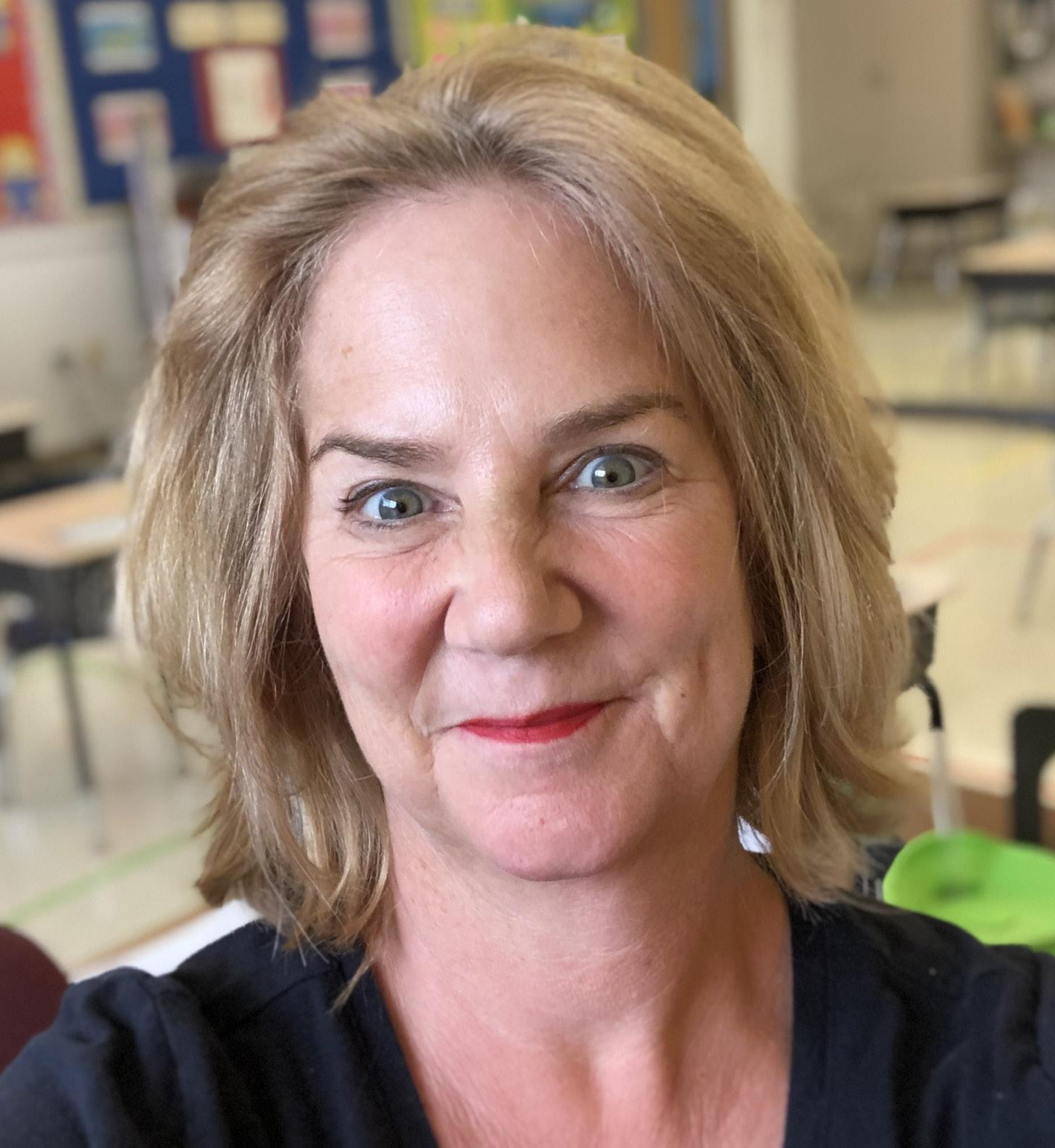
COURTESY OF MRS. JEN HIGGINS
Mrs. Jen Higgins in her classroom
Ms. Bond remains “happily curious”
Joey Kauffman ’23
Form II humanities teacher Ms. Hilary Bond has never failed to convey her curiosity for the world during her five years as an English and world history teacher. Ms. Bond has undoubtedly led students to improve their analytical reading and writing skills while also mentoring them in the arguably more important journey of seeking out and appreciating other peoples’ stories.
“Of course it’s very satisfying to see people improve their skills, right, like, ‘He started out as a crappy writer and now he can organize things; he’s got his paragraphs well-done,’” Ms. Bond said. “But really, I want [my students] to leave being excited and curious about the world and … I guess just encouraging people to be happily curious about the world.”
Through her unique position as both an English and a history teacher, Ms. Bond has worked to foster this curiosity in both areas of the humanities.
“Really, [teaching history and English] is about empathy, learning about other people and other perspectives and coming to understand them. That is where my curiosity lies: and hearing other people’s stories, whether it’s your historical story or just, like, your memoir, or a story that you invented.”
But as she finishes her fifth year here, Ms. Bond is preparing to leave for California. Although she is a Seattle native, she says she has lived in California’s Bay Area longer than she has lived in Seattle. She is returning to the school where she taught before Haverford.
“It’s like going home, I guess,” Ms. Bond said. “I have a lot of great friends there, former students, and a lot of my relatives live in the area as well, including my sister and her kids.”
Ms. Bond champions the idea of traveling. As a Brown alum, she spoke of going to college on the other side of the country: “I am a big advocate for taking those kinds of risks and exploring the world in general.”
At Brown, she was an international relations major, which strengthened her love of learning by allowing her to “dabble in a million different areas.”
“I could take courses in almost every field,” she said.
After college, she engaged with her love of traveling by spending half a year in Nepal, a country where many Tibetan refugees live. While also studying the Tibetan language, she met a group of Tibetan refugees who made a living by weaving and selling rugs.
“They would bring in these massive bags of raw wool and they’d hike them in, and then they’d card them and spin them and dye them and weave them into carpets. And then they’d have to march these giant carpets out of the mountains to be sold,” Ms. Bond said. “It’s a hard life.”
This was the beginning of Ms. Bond’s life-long interest in the refugee experience. She is interested in the process of immigration, as she knows that her family, as well as most Americans, immigrated here for a specific set of reasons and underwent a wide range of experiences as immigrants. She believes that when dealing with these types of issues, which can be very political, we all often forget what our motives should be.
“Something that we haven’t talked enough about is this, like, working towards peace. And to do that takes compromise. And compromise is something that is not being modeled for us very well, anywhere, right now,” Ms. Bond said. “And it’s seen as being a weakness to quote-on-quote ‘give in’ instead of acknowledging somebody feels a certain way because they’ve had this experience.”
Ms. Bond’ sees her time here as an extension of her advocacy for exploring the world. She has explored the Haverford and Main Line world, and learned from those experiences.
“Coming [to Haverford] at that specific time really forced me to [be open minded],” Ms. Bond said. “It was hard, but at the same time, sometimes the things that are hard and painful for us are what help us to grow and really come clear with what our values are.”
Community members who care about academic curiosity and open-mindedness have benefited from Ms. Bond’s dedication to the school.
“I’m going to miss my colleagues a lot, for sure. I love my colleagues,” Ms. Bond said. “And my students too.”
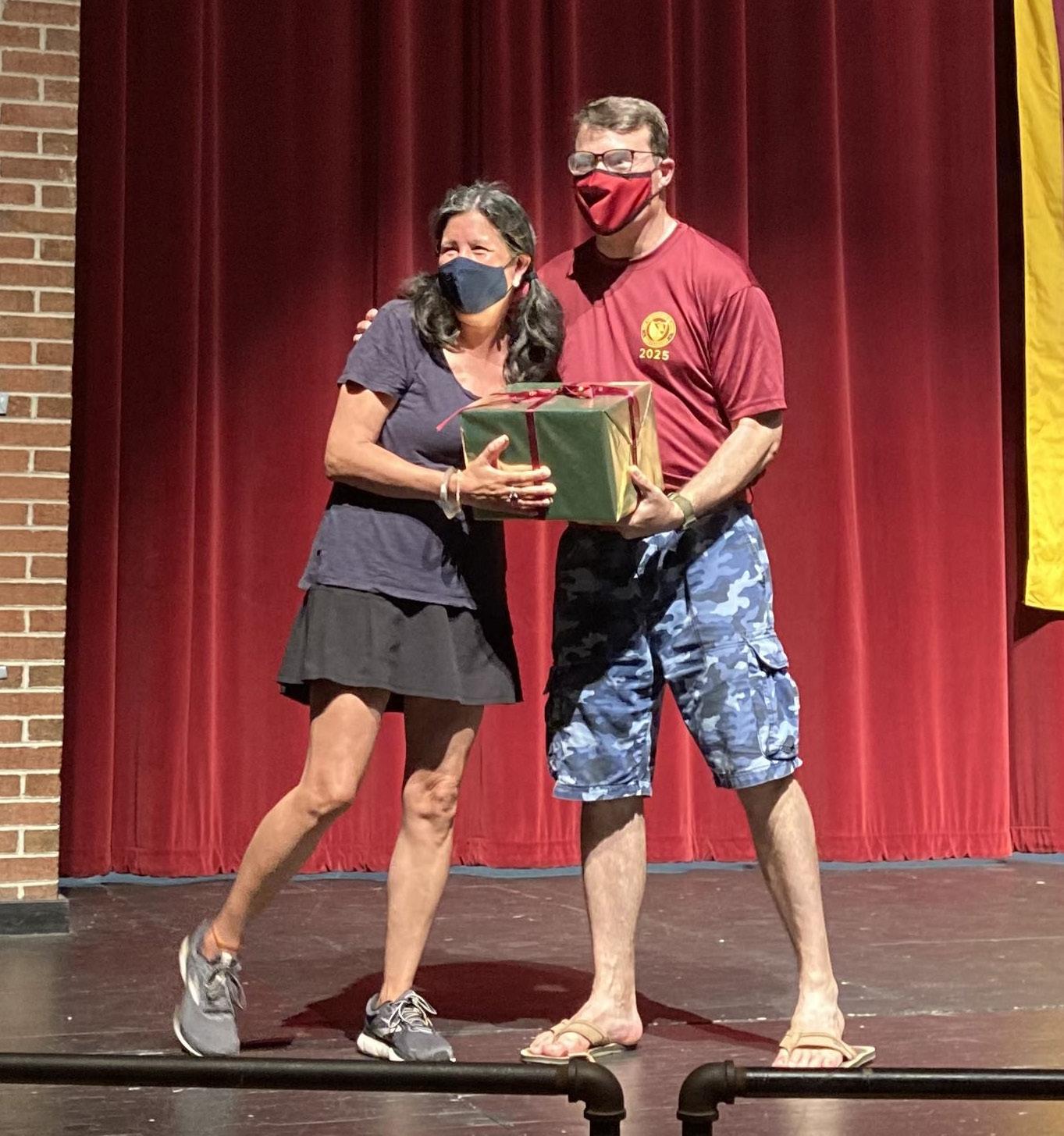
INDEX STAFF
Dr. John Nagl (right) says goodbye to Ms. Hilary Bond (left), June 4, 2021
Matthew Schwartz ’21
Pre-pandemic you may have found Señora Schroeder roaming Wilson Hall’s third floor before returning to her class off of the Big Room. Now, she resides in Virtue Village. Soon, she’ll be home, taking online classes from Temple University as she completes her Ph.D. in Spanish.
This isn’t Mrs. Schroeder’s first time departing Haverford. Back in 2014, she was a language teacher in the upper school for one year. Since returning in 2018, she has noticed many improvements during the four years she was gone.
“I think the school is doing a great job in educating the faculty and giving them resources with diversity training and support groups, so we can respond to what’s happening in the world today,” Mrs. Schroeder said.
Even though her time at Haverford has been relatively short, Mrs. Schroeder has made a large impact on the students who have come through her Spanish classes.
“I’ve never felt nervous or hesitant to ask her a question in her class, and that relationship clicked extremely quick,” Sixth Former Ryan Ngo said. “I will definitely miss her, and I anticipate myself moving forward in life with a greater love for learning because of mentors like her.”
A recurring theme from students on Mrs. Schroeder’s teaching style, was how engaging it is. They talk about her ability to teach information in an exciting and approachable way.
“I love what I do. I love what I’m teaching, I love teaching in general, and I love the students here,” Mrs. Schroeder said. “I think that when you really are passionate about something it energizes you and makes you do your job better.”
Deciding to pursue her Ph.D. in Spanish was a tough decision for Mrs. Schroeder, but it’s been a long-term goal.
She considered staying for an extra few years when studying for her master’s at Georgetown but felt it would be a large commitment and instead immediately went into teaching at a private school in New Jersey.
Now, with the pandemic opening the door to virtual classes at many universities, in particular Temple, Mrs. Schroeder has the opportunity to earn her Ph.D. while still caring for three children at home.
In terms of what’s in store for her after Temple, Mrs. Schroeder isn’t completely sure.
“I definitely want to go back to teaching, whether that’s at the college or high school level, I don’t know,” Mrs. Schroeder said. “It will probably depend on my kids and what their needs are, but that being said, I absolutely love teaching high school.”
Mrs. Schroeder has had experience teaching both in a high school and college setting through her work as an adjunct professor for Saint Joseph’s University for two years prior to returning to Haverford.
“Obviously teaching at the college level gives you more flexibility, however, college students are not funny. I mean they come in, they’re there to learn, do their job, and then leave,” Mrs. Schroeder said. “Something I had forgotten, which Haverford quickly reminded me, was that [high school students] can put humor into just about everything. Sometimes it’s not the appropriate time, but it lightens the mood, it lightens the day and makes learning more fun.”
In her three years here, Mrs. Schroeder created a supportive environment for her students, where they feel comfortable asking questions, are excited about the class, and overall enjoy learning Spanish.
“Señora Schroeder’s kindness is genuine and her engaged yet relaxed teaching style made Spanish really fun to learn,” Sixth Former George Lanchoney said. “Because of her, I want to pursue [Spanish] further in college.”
RYAN NGO ’21
MRS. CATHERINE SCHROEDER
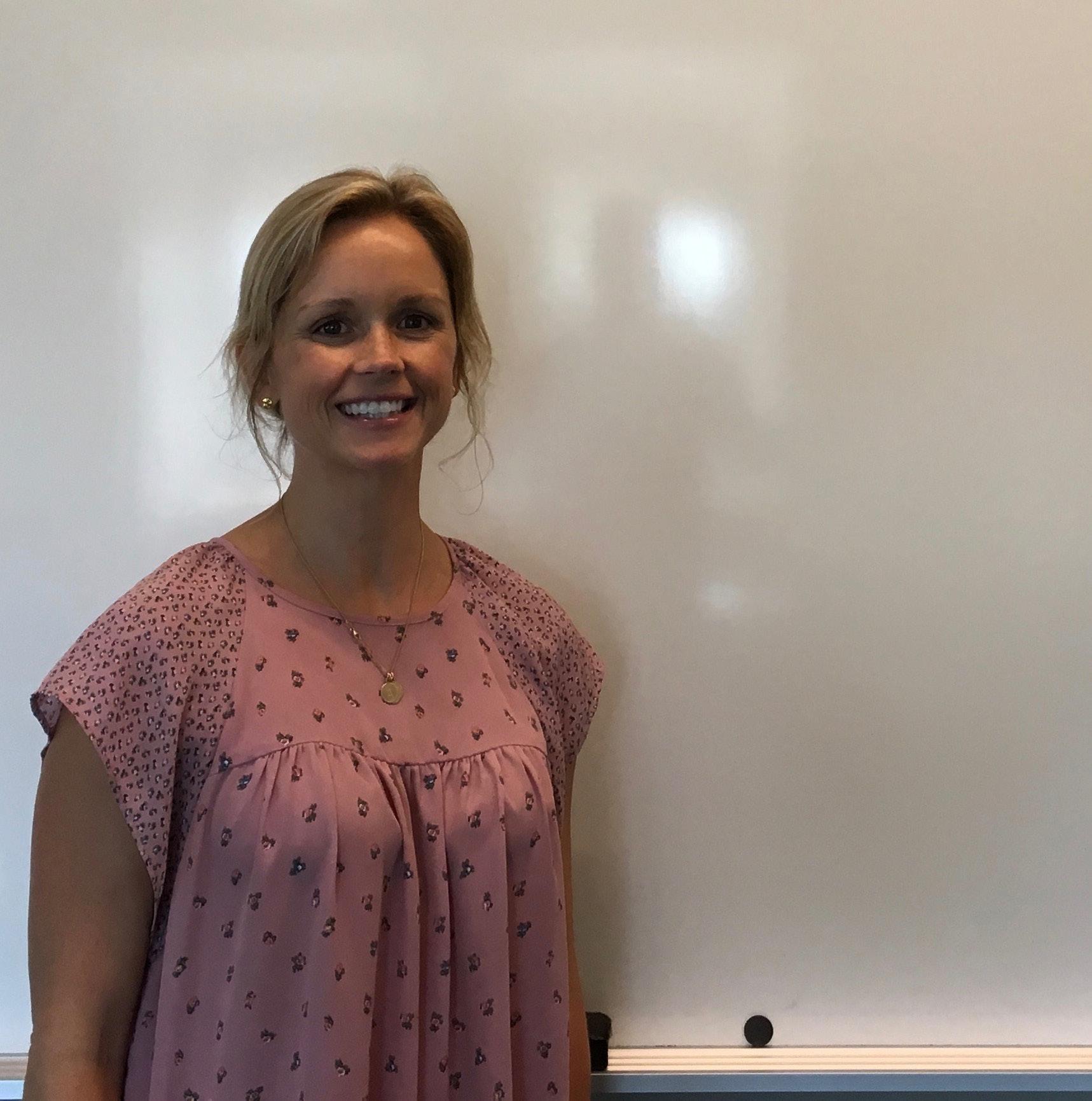
INDEX STAFF
Mrs. Catherine Schroeder in her room, September 2018
Ms. Barton prepares to move to the Mountain West
Index Staff
Sixth grade English teacher Ms. Sara Barton recently decided to move to Denver, Colorado with her family
After many years teaching in both the lower and middle schools since 2009, Ms. Barton has left a lasting imprint on the institution. “Not only am I sad to know that I will not see her around campus anymore, but also that the future sixth graders will not be able to experience her teaching,” Fourth Former Jack Suter said. “Before sixth grade English my knowledge of grammar and writing was much less established. Not only did I learn grammar and writing, but I also learned so many lessons from the different books we read in English class. If it weren’t for Ms. Barton… I wouldn’t have taken an interest in writing.”
Ms. Barton gave her students a chance for independent reading as well as creative writing. This allowed students to be creative instead of writing based off of one prompt or from one rubric. Students learned how to develop ideas and communicate them effectively. Independent reading also gave students the opportunity to pursue something in which they truly showed interest.
“I had the experience of having Ms. Barton twice during my time at Haverford,” Fourth Former Connor Pinsk said. “I had her in fourth grade and in sixth grade. Sixth grade was her first year as an English teacher in middle school, and it was very cool to have the same teacher twice, especially when it was one that I liked so much.”
In addition to Ms. Barton’s classroom work, she devoted much time and energy over a number of years running the parent SEED (Seeking Educational Equity and Diversity) group, which seeks to strengthen the community in terms of its understanding of race, class, and gender.
According to English Department Chair Mr. Thomas Stambaugh, “Ms. Barton’s unique background provided insight into the transition from lower to middle school. She has also been a warm and supportive colleague, eager to offer her wisdom to fellow teachers and strengthen the middle years of reading and writing instruction.”
As she prepares to move, Ms. Barton is excited for various aspects of the city she will call home.
“I am looking forward to the public transportation in Denver,” Ms. Barton said, “along with trying to find the best dog parks in Denver.”
But her impact on the students whom she has taught will remain at Haverford.
“If I haven’t yet given you an idea of the thoughtful, wise, and kind person Ms. Barton is,” Suter said, “one of my favorite sayings of hers is, ‘Focus on the learning and the grades will come.’ Ms. Barton was a teacher who used grades as opportunities for feedback, learning, and helped to show what one needed more help with.”
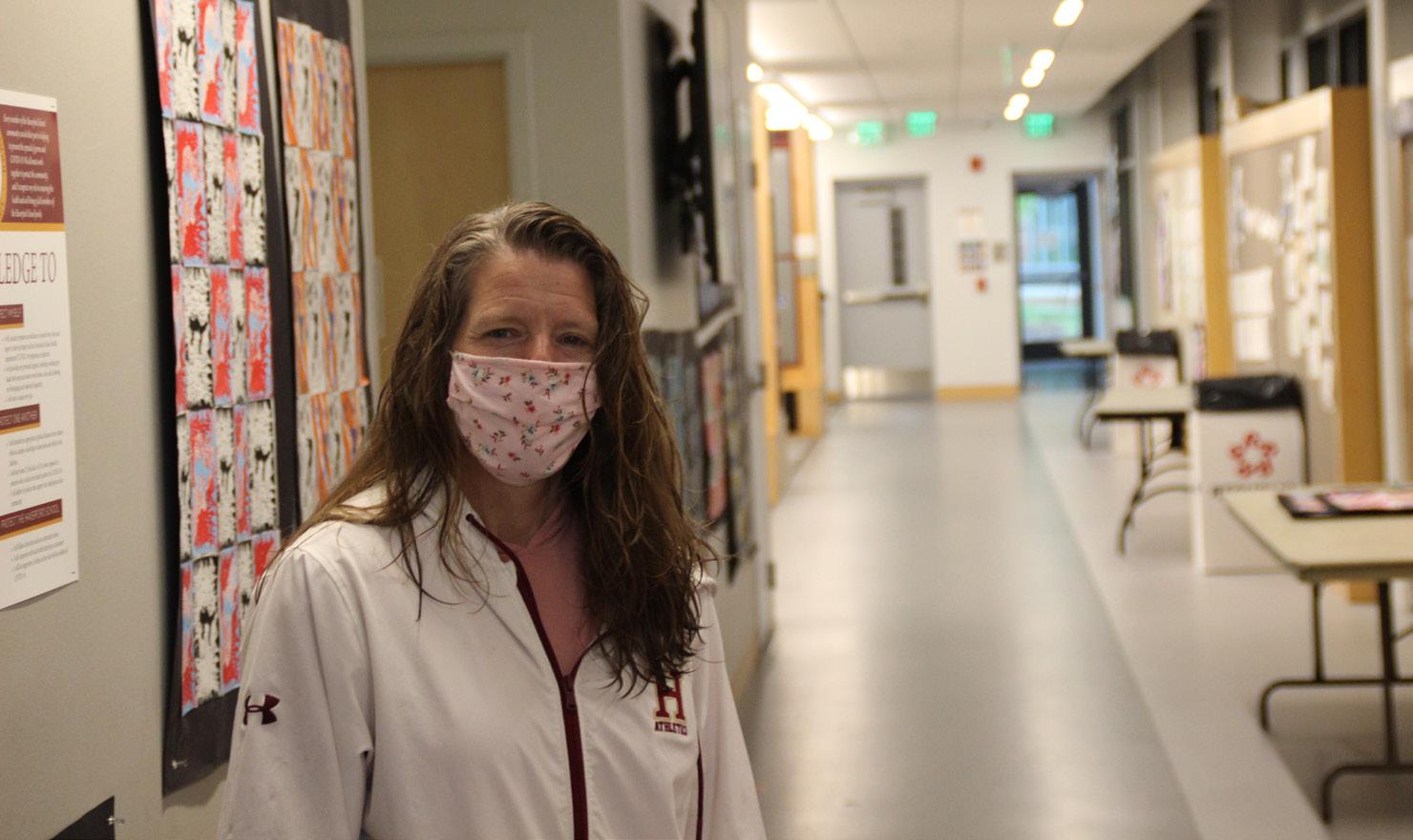
MR. THOMAS STAMBAUGH
JACK SUTER ’23
Library weathers pandemic year, diversifying stacks, updating archives
Jingyuan Chen ’23
For the past school year, everything was unusual. The school campus, bound by new regulations and limitations, felt like an entirely different place. Severinghaus Library was no exception. The pandemic has greatly altered the library’s norms.
“We couldn’t have as many people in [the library]. All the students had to be supervised for mask-wearing, but we couldn’t really do that,” Head of Information Services Ms. Lisa Synder said. “Because of the pandemic, we couldn’t allow people to go to the stacks and get books. We didn’t get to function in the way that we most like to function, which is as a community hub.”
Library events were also limited, but staff sustained some activities during the pandemic. “During lockdown we would have virtual Open Library Sessions for kids to come in and build connections. We were also doing the head of school’s History Behind the Headlines, where the headmaster would just come in and talk about what was happening on the headlines,” Ms. Snyder said. “This year we didn’t do a whole lot of programming. But I’m looking forward to being able to start that back up.”
The new schedule and the lack of free periods during the pandemic also hindered students from going to the library.
“Because of the pandemic, our room capacity had to be reduced by about a quarter. But it’s really strange, as we didn’t even get to that capacity. The thing is that everybody had class all day long. We didn’t have students here during their usual free period. Nobody had a free period,” Ms. Snyder said.
“I entered the library almost every day this whole year,” Fourth Former Jack Suter said. “The most I spent in the library this year was an hour. Not having free periods or time to work during the day, there wasn’t really any time to be spent in the library.”
Although events at the library seem to be heavily limited due to the pandemic, there’s also a positive aspect to the library’s new-found tranquility.
JACK SUTER ’23
“The library wasn’t like a hangout spot for our class like it was last year. Now I often use the library as a place to meet people when we need to get something done or when we need to work on a project, ” Suter said.
“It’s actually been really nice because more students come in to find a place to study or to do some work,” Ms. Snyder said. “The other thing I noticed is when they needed to take some meetings and Zoom with a college counselor, we don’t really have those spaces readily available for kids. But they would come in anyway.”
The closures of other study hubs around the school have also attracted students to the Ms. Lisa Snyder and Ms. Cinnie Slack at Severinghaus Library’s front desk JACK SUTER ’23
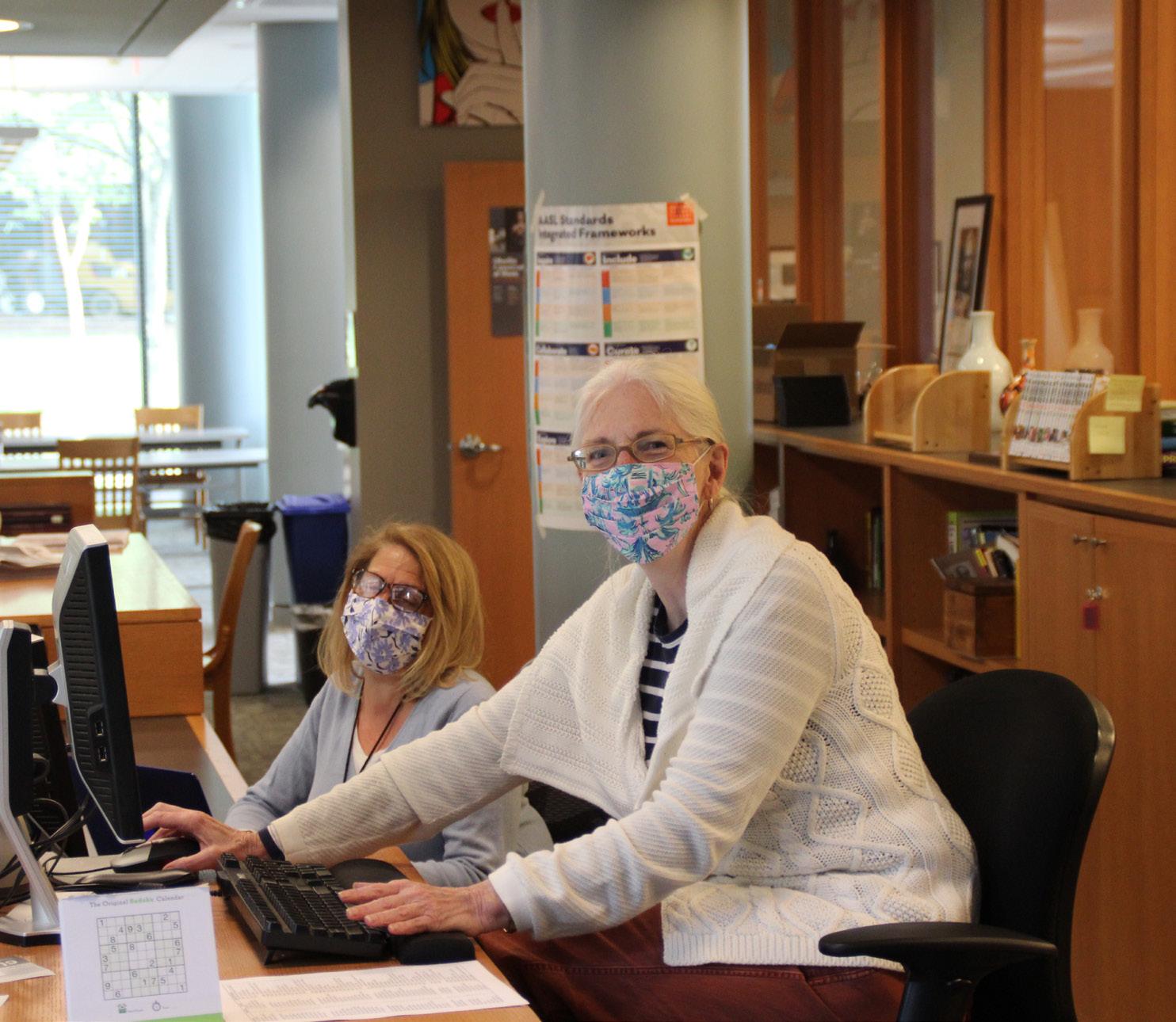
library.
“Before, if you wanted to chill out and just get some work done, you could also go literally anywhere else,” Fourth Former Nathan Mirin said. “Now, the library is the only place to go when people have free time at school.”
Aside from students who found this new norm enjoyable, the library staff also took advantage of their new-found free time to organize things happening backstage.
“We were able to do things that were centered around our collections,” Ms. Snyder said. “We were doing a DEI (diversity, equity and inclusion) audit of our collection. We also run the archives, so we’ve also been able to work downstairs in the archives a little more,” Ms. Snyder said. “The benefit is that there have been some other opportunities like this, but we do want the kids back. We really want people who weren’t able to come this year to be able to come here next year.”
Follow @haverford_index on Instagram for the latest articles right in your feed!

academics
Teachers process the past year’s challenges
Adiyan Nayak ’24

JACK SUTER ’23
A student presents a poem to Mr. Keefe and his English class
For many students and teachers, the 2020-21 school year challenged the academic process. In the sumteacher Mr. Keith Belson said. “It really allowed me to compartmentalize my units. For English, I find that communication’s kind of mer of 2020, unknowns surrounded the status of the upcoming year. Te possibility of returning to in-person learning existed but seemed irrational when considering all of the steps that would need to be taken. But as the academic year grew closer, that possibility became a reality as members of the school prepared to return to the campus.
The return, however, was not complete.
Teachers adjusted their methods to follow school guidelines. The new normal included ninety-minute classes in a quarter system, a virtual-learning option, and a predominately online learning system.
The main restriction that hampered the educational process was the six-foot distance. Latin teacher Dr. Andrew Fenton felt that his classes changed significantly as a result of social distancing.
“There were a few different projects that we weren’t able to do this year because they involved a lot of close contact and physical activity,” Dr. Fenton said.
Calculus, engineering, and physics teacher Mr. Adam Myers echoed these sentiments.
“All of the science classes are heavily project-based, and we weren’t able to do a lot of the group work simply because people couldn’t be close enough to work safely,” Mr. Myers said. “We had to change a lot of projects to online platforms and digital simulations.”
While teachers removed many projects and group activities from the curriculum this year, there were still some positives to the altered learning environment. a big part of that class, so we split it up by speaking and writing in the first half of the year, and then the second half really lent itself nicely to the listening component.” The quarter system allowed students to focus on a smaller number of classes, and it served the same purpose for teachers handling multiple duties.
“Being in two departments, it really helped me to focus on a smaller number of tasks,” Mr. Myers said. “I could stay on top of my responsibilities so I could better help the students stay on top of their responsibilities.”
Another helpful element that was added to the academic system was the virtual option for students.
Teachers were able to involve students in their classes that may have missed the day entirely in previous years.
“I had a student who was injured and out for the last couple weeks,” Dr. Fenton said. “In past years, I don’t know what he would have done. But it’s really nice to have the option to have him there with us, even if he can’t participate exactly the same way.”
For the students in class, the presence of computers dominated the learning experience. Many teachers moved away from on-paper assignments and relied heavily on online platforms. As classes return to prepandemic states, the computer-based learning environment may continue.
“I think we’re here to stay online,” Mr. Belson said. “It’s just a lot easier to organize online assignments than it is to collect a stack of papers. But I do recognize that screen time is an issue for students, so I’ll be cognizant of that as I balance paper and online work.”
In addition to screen time, some teachers feel that the learning process is diminished by using a computer.
Dr. Fenton said, “There’s pretty good research that shows students retain information better when they are taking notes by hand, learning in a non-virtual way, and having a tactile experience.”
As the next school year approaches, the value of on-paper learning may not be entirely forgotten.
“I think there will inevitably be some kind of shift back towards the paper,” Mr. Belson said. “There are a lot of benefits to laboring through things as opposed to tapping on a keyboard.”
The administration looks to return to some pre-pandemic academic procedures. But the effects of the past year will linger. The quarter system will continue next year, and many elements of the online approach will remain.
Perhaps it is only natural that the school will continue to feel the impact of such a historic time.
MR. ADAM MYERS “Tere’s pretty good research that shows students retain information better when they are taking notes by hand, learning in a non-virtual way, and having a tactile experience.”

DR. ANDREW FENTON




